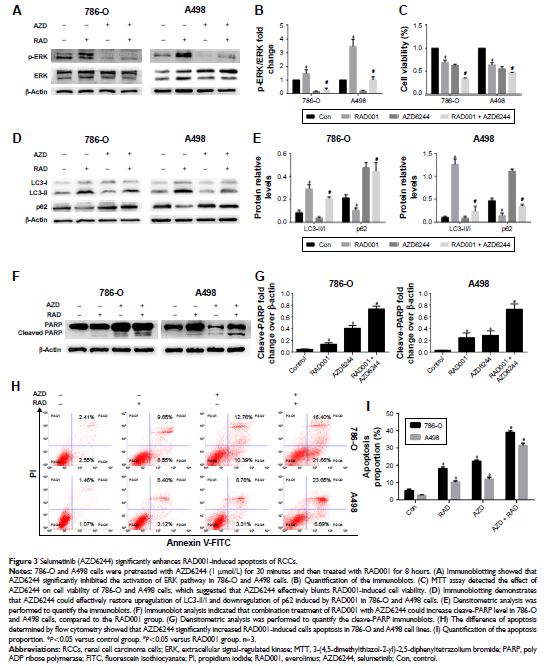9 0 5 7 8
论文已发表
注册即可获取德孚的最新动态
IF 收录期刊
- 2.6 Breast Cancer (Dove Med Press)
- 3.9 Clin Epidemiol
- 3.3 Cancer Manag Res
- 3.9 Infect Drug Resist
- 3.6 Clin Interv Aging
- 4.8 Drug Des Dev Ther
- 2.8 Int J Chronic Obstr
- 8.0 Int J Nanomed
- 2.3 Int J Women's Health
- 3.2 Neuropsych Dis Treat
- 4.0 OncoTargets Ther
- 2.2 Patient Prefer Adher
- 2.8 Ther Clin Risk Manag
- 2.7 J Pain Res
- 3.3 Diabet Metab Synd Ob
- 4.3 Psychol Res Behav Ma
- 3.4 Nat Sci Sleep
- 1.9 Pharmgenomics Pers Med
- 3.5 Risk Manag Healthc Policy
- 4.5 J Inflamm Res
- 2.3 Int J Gen Med
- 4.1 J Hepatocell Carcinoma
- 3.2 J Asthma Allergy
- 2.3 Clin Cosmet Investig Dermatol
- 3.3 J Multidiscip Healthc

通过肾细胞癌细胞中 ERK 激活的保护性自噬途径减弱依维莫司诱导的细胞毒性
Authors Zeng YZ, Tian XF, Wang Q, He WY, Fan J, Gou X
Received 21 December 2017
Accepted for publication 9 March 2018
Published 19 April 2018 Volume 2018:12 Pages 911—920
DOI https://doi.org/10.2147/DDDT.S160557
Checked for plagiarism Yes
Review by Single-blind
Peer reviewers approved by Dr Andrew Yee
Peer reviewer comments 3
Editor who approved publication: Dr Anastasios Lymperopoulos
Aim: The mammalian target of rapamycin (mTOR) pathway is a critical
target for cancer treatment and the mTOR inhibitor everolimus (RAD001) has been
approved for treatment of renal cell carcinoma (RCC). However, the limited
efficacy of RAD001 has led to the development of drug resistance. Autophagy is
closely related to cell survival and death, which may be activated under RAD001
stimulation. The aim of the present study was to identify the underlying
mechanisms of RAD001 resistance in RCC cells through cytoprotective autophagy
involving activation of the extracellular signal-regulated kinase (ERK)
pathway.
Methods and
results: RAD001 strongly induced autophagy of
RCC cells in a dose- and time-dependent manner, as confirmed by Western blot
analysis. Importantly, suppression of autophagy by the pharmacological
inhibitor chloroquine effectively enhanced RAD001-induced apoptotic
cytotoxicity, as demonstrated by the
3-(4,5-dimethylthiazol-2-yl)-2,5-diphenyltetrazolium bromide (MTT) assay and
Western blot analysis, indicating a cytoprotective role for RAD001-induced
autophagy. In addition, as was shown by the MTT assay, flow cytometry, and
Western blot analysis, RAD001 robustly activated ERK, but not c-Jun N-terminal
kinase and p38. Activation of ERK was inhibited by the pharmacological
inhibitor selumetinib (AZD6244), which effectively promoted RAD001-induced cell
death. Moreover, employing AZD6244 markedly attenuated RAD001-induced autophagy
and enhanced RAD001-induced apoptosis, which play a central role in
RAD001-induced cell death. Furthermore, RAD001-induced autophagy is regulated
by ERK-mediated phosphorylation of Beclin-1 and B-cell lymphoma 2, as confirmed
by Western blot analysis.
Conclusion: These results suggest that RAD001-induced autophagy involves
activation of the ERK, which may impair cytotoxicity of RAD001 in RCC cells.
Thus, inhibition of the activation of ERK pathway-mediated autophagy may be
useful to overcome chemoresistance to RAD001.
Keywords: apoptosis, autophagy, everolimus, ERK, renal cancer, selumetinib
